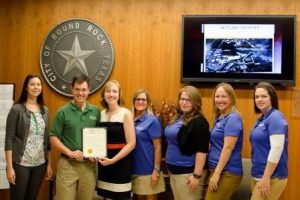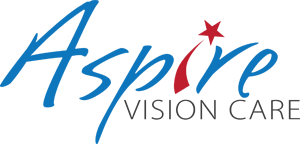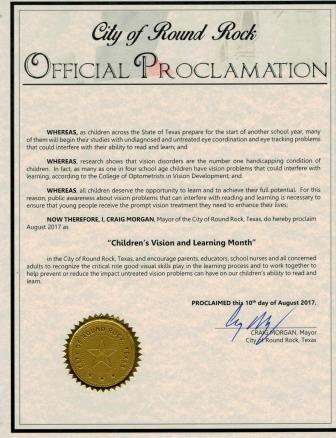Aspire Vision Care Leads the Way in Vision Treatment for Kids
 Round Rock, Texas – September, 2017 – During a ceremony held on August 10, Round Rock Mayor Craig Morgan presented Dr. Nancy Guenthner, of Aspire Vision Care, with a special proclamation dedicated to children’s vision. Dr. Guenthner is committed consistently to optimizing children’s vision to maximize their learning potential, and the team at Aspire Vision Care is proud to have been the driving force behind this notable proclamation.
Round Rock, Texas – September, 2017 – During a ceremony held on August 10, Round Rock Mayor Craig Morgan presented Dr. Nancy Guenthner, of Aspire Vision Care, with a special proclamation dedicated to children’s vision. Dr. Guenthner is committed consistently to optimizing children’s vision to maximize their learning potential, and the team at Aspire Vision Care is proud to have been the driving force behind this notable proclamation.
As Round Rock students settled into their classrooms for a new school year, it is essential that teachers, parents and all school staff are aware of how vision affects learning. Basic skills, such as reading and writing, depend upon healthy, functional eyesight. When pediatric vision disorders remain undetected and untreated, learning problems can result. The official proclamation of August as the “Children’s Vision and Learning Month” helps children maximize their potential via a greater awareness of pediatric vision care.
“Excellent eyesight is likely the most important school supply. By the time kids enter third grade, reading becomes the primary method of learning. Students must keep their eyes focused and converged on close-up work for long periods of time. When a child isn’t able to do this, the problem may be due to an underlying vision condition. It is critical to rule out any visual restrictions before classifying the child as having a reading problem,” says Dr. Guenthner.
Typical warning signs of a pediatric vision condition include symptoms such as eye strain, frequent headaches, eye rubbing, double vision (particularly when reading), and a general avoidance of reading or doing exercises that depend upon near vision. Constantly losing place or missing words while reading is another usual sign. Difficulty with changing focus from near to far can make it hard for kids to copy from the board.
“When children cannot see clearly in the classroom, their scholastic performance suffers. This can lead to poor self-esteem and a general lack of interest in learning. In turn, behavioral issues, such as hyperactivity during class, may appear as a consequence. Yet really, this misbehavior may all stem from an untreated vision condition,” Dr. Guenthner explains.
 Parents and teachers often assume that school vision screenings are a reliable means of diagnosing or ruling out all visual problems. However, the typical school vision test checks primarily for 20/20 visual acuity and the child’s ability to see distance, one eye at a time. Standard eye chart tests do not evaluate necessary skills such as convergence, tracking, visual perception and eye mobility. Only a comprehensive eye exam by an eye doctor assesses all the components of healthy, functional vision.
Parents and teachers often assume that school vision screenings are a reliable means of diagnosing or ruling out all visual problems. However, the typical school vision test checks primarily for 20/20 visual acuity and the child’s ability to see distance, one eye at a time. Standard eye chart tests do not evaluate necessary skills such as convergence, tracking, visual perception and eye mobility. Only a comprehensive eye exam by an eye doctor assesses all the components of healthy, functional vision.
“Vision must enhance performance in school, not interfere with it,” says Dr. Guenthner says. “Vision-related learning problems can be treated in a variety of ways. Some kids only need a prescription for eyeglasses or contact lenses. Others may require a series of customized neuro-optometric therapy sessions, which is a specialized field of vision care. With appropriate care from an eye care professional, kids do not have to grow up challenged by learning-related vision problems.”

